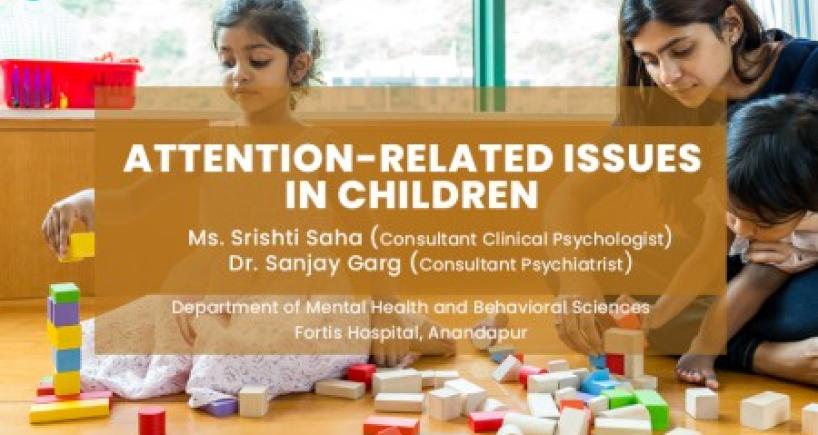
Mental Health and Behavioural Sciences
Attention-Related Issues In Children
Dr. Sanjay Garg Nov 07, 2023
As the biology class went on, Rohit’s teacher noticed, yet again, a far-away look in his eyes. It was amply clear to the teacher that his mind was anywhere but in the class. She sighed, and shook her head, unable to figure out how to address this growing problem.
An alarming number of children these days appear to be having difficulty in concentration. More and more parents as well as teachers report that children and adolescents are more easily distracted, more unmindful, or simply unable to focus on the task at hand.
However, interestingly enough, most of them will also report that they seem to have absolutely no trouble focusing for hours on gadgets.
When a child seems to be struggling to pay attention to tasks, it may be because of a mental health condition called Attention Deficit Hyperactivity Disorder (ADHD).
An increase in attentional issues among children has also led to a growing awareness of this entity. Indeed, research shows that the prevalence of ADHD is on the rise.
Data from 2003, 2007, and 2011 National Survey of Children’s Health (NSCH) reflect this worrying trend.
Approximately 2 million more U.S. children/adolescents aged 4 to 17 years had been diagnosed with ADHD in 2011, compared to 2003.
The detailed figures reveal that in 2003, 7.8% of children/adolescents between 4-17 years of age had received an ADHD diagnosis by a health care provider, as reported by parents; in 2007, the same was true for 9.5%, and in 2011, it further rose to 11.0%. In 2016, approximately 9.4% of children 2-17 years of age (6.1 million) had been diagnosed with ADHD, according to parent report. Although the figures seemed to have reduced slightly, it may be because the survey of 2016 used different methods. The more disturbing observation however is that the lower age range had to be expanded to 2 years, instead of 4.
In India, the prevalence of ADHD has been reported from 1.6 to 17.9% based on studies in 2005 and 2007.
Even keeping the figures aside, simple observation will tell us that people are finding it increasingly more difficult to concentrate.
Many individuals dejectedly report that they can no longer summon the necessary focus to read a book or find the patience to solve a crossword.
However, not all distractions are necessarily indications of ADHD. Not everyone who struggles with attentional issues qualifies for a diagnosis of ADHD.
Diagnosis can only be arrived at by a qualified mental health professional after careful consideration of multiple factors.
Irrespective of the question of diagnosis is the question of why this trend of poor attention is on the rise, especially among children.
The answer lies in a careful look at the world in which we are living and children are growing up.
The number of technological innovations and the amount of information that children are exposed to these days is enough to make the mind boggle.
The internet and other media instruments are persistent, pervasive, and relentless.
In a world, where there are always notifications to attend to and news to catch up on, and trends to keep updated about, it is no wonder that we are unable to focus. Children today are growing up with far more connection to gadgets than to humans or to nature. Technology, in its various avatars, is deliberately designed to be interrupting and engrossing. Most parents visiting us at our clinic are confused regarding the attentional issues because they observe that when their children are in front of a TV or a mobile phone, they miraculously seem to possess near-perfect concentration. There is a reason behind this! Any gadget, with its high level of dynamicity, in terms of graphics, colors, designs, and sounds of its content, provides the child with a continuously high degree of stimulation. It is comparatively easier to focus on something like that. But for a developing brain that is hooked to such intensity of stimulation, anything which offers any less is simply not good enough to grasp attention.
Processing academic books on the other hand, which lack these engrossing factors, therefore becomes a daunting task.
The other disturbing trend we, as mental health professionals, are observing is that children are simply not engaging enough in outdoor or extra-curricular activities. Ask almost any child what his favorite form of recreation is, and more often than not, the inevitable answer is mobile games or interaction on social media. So before we jump to the diagnosis of a mental illness, perhaps a more astute observation of our lifestyles is warranted. Some alterations in our and our children’s environment may be in order.
Restrict screen time
Starting with the obvious first, the amount of time spent on gadgets needs to be limited. Admittedly, cutting off all technology is an overambitious and unrealistic plan, but restrictions are definitely required. Too much of anything is bad, and not every want can always be gratified- are messages that children must receive from the very formative years. A good limit for all school-going children is an hour of gadget time for recreation daily, preferably after homework and other important chores are completed.Develop interests and hobbies
Participation in outdoor sports, and other hobbies such as dance, painting, or music, can serve as alternate forms of stimulation for the child. Screen use is often a way of passing time for children because healthier options have not been explored. Not only are these activities harmless, they contribute to the overall personality development of a child.Facilitate good sleep
Good quality of sleep is the corner stone of a well-functioning mind. Setting fixed times for sleep and awakening, not using any gadgets one hour prior to bedtime and making the bedroom a low- stimulation area, are techniques that indirectly contribute to increased attentional abilities.Relax and train the mind
Daily practice of a few simple relaxation techniques such as deep breathing exercises can go a long way to strengthen focus. In addition, tasks such as crosswords, mazes, or puzzles can help sharpen the mind. Engaging in such tasks for even a few minutes daily can be extremely helpful.Seek professional assistance
If none of these techniques seem to work, or the problem already appears to have become too advanced, or you are worried that the attentional struggles may be signs of a mental health issue, do not hesitate to seek guidance from a mental health professional.Categories
Clear allMeet the doctor

Dr. Sanjay Garg
CONSULTANT MENTAL HEALTH & BEHAVIOURAL SCIENCES | Fortis Anandapur
- Mental Health and Behavioural Sciences | Psychiatry | Mental Health and Behavioural Sciences
-
23 Years
-
1500




















